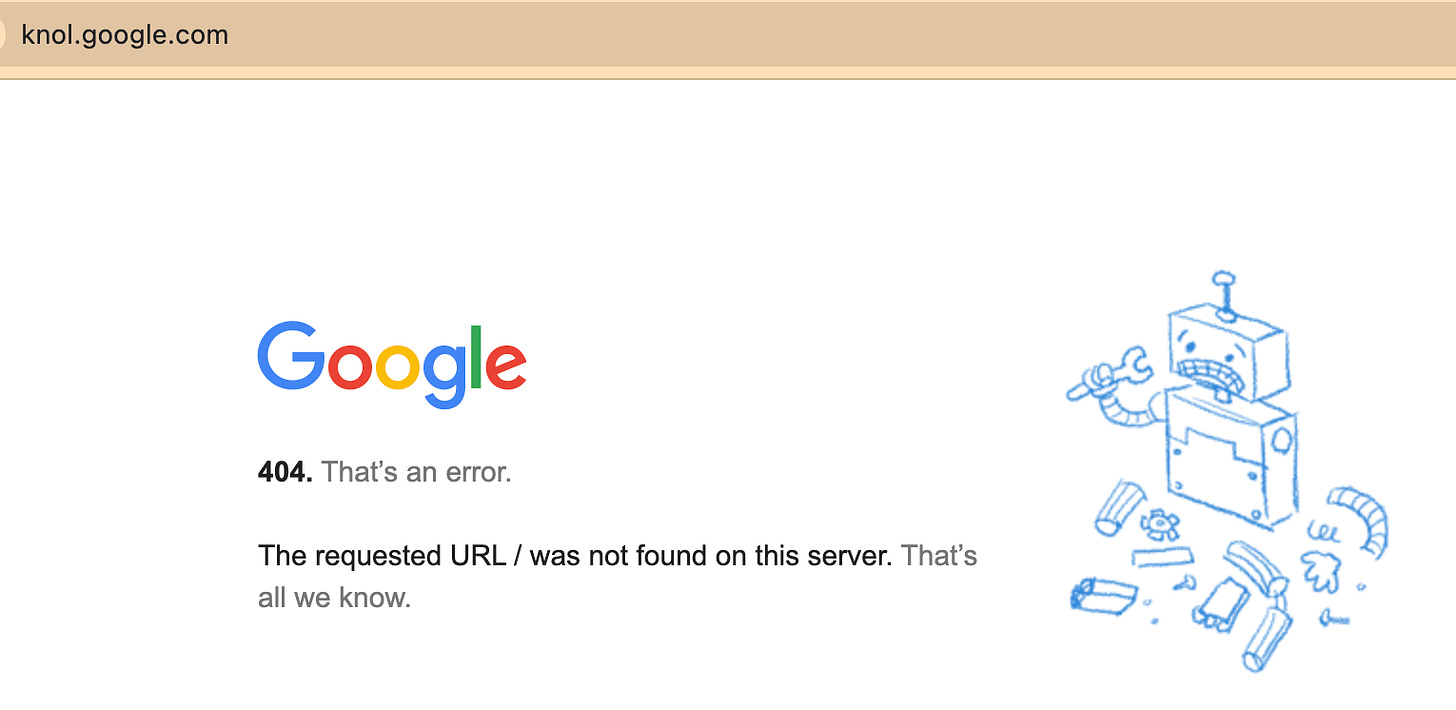Remember Knol, Google’s user-generated Encyclopedia?
Yeah, me neither.
Since starting Edit History (the newsletter/blog you’re reading right now), I’ve found myself digging into pieces of Wikipedia and the internet that I had not previously encountered. One of those is Knol, described by Google in an official Blogspot post published on December 13, 2007 as:
a new, free tool that we are calling "knol", which stands for a unit of knowledge. Our goal is to encourage people who know a particular subject to write an authoritative article about it.
The initial version of it was only open to a “selected group of people”. On July 23, 2008, Google opened it to everyone, saying:
Knols are authoritative articles about specific topics, written by people who know about those subjects. Today, we're making Knol available to everyone.
If you’re wondering how this was different than Wikipedia, it seems to be that:
Authors were front-and-center on Knol, unlike the editors of Wikipedia who remain in the background. “The key principle behind Knol is authorship.”
There could be multiple articles (called knols, apparently) about the same topic. “We expect that there will be multiple knols on the same subject, and we think that is good.”
Every knol was allowed to include one cartoon from The New Yorker. Somehow, this is not a joke. “We are happy to announce an agreement with the New Yorker magazine which allows any author to add one cartoon per knol from the New Yorker’'s extensive cartoon repository. Cartoons are an effective (and fun) way to make your point, even on the most serious topics.”
Authors could decide whether or not to run ads on their articles. “At the discretion of the author, a knol may include ads from our AdSense program.”
Suffice it to say, Knol was a bad idea that failed. Like a lot of Google’s failed initiatives from that era (Google Wave, Google Plus, Google Hotpot, Google Related), Knol lasted longer than you would have expected and spent most of its time dying.
According to a TechCrunch article from 2009, Knol quickly became “a Craiglist wannabe” where people started selling their old stuff.
But I had to see this for myself. Using the Wayback Machine, I read through the list of all the knols featured on the Knol homepage on July 26, 2008. Here is a sampling:
“Film Financing: an overview of global incentives” by Twain Luu
“Ringworm (Tinea Corporis, Tinea Faciei)” by Nikki Levin
“Devil May Cry 4” by Chewy -
“Toilet repair” by The Family Handyman Magazine
“Jaw Fractures” by Andrew Murr
“Croup” by Christopher Johnson
“Wood trim'“ by The Family Handyman Magazine
Of the entire list of knols on the Knol homepage, the only one I really wanted to read was “The Decline of Women in Computer Science from 1940-1982.” Good news: that one is still available (although I haven’t read it yet) at this Wayback Machine link.
So. Why did Knol fail? But more importantly:
Why don’t I remember any of this?
Like I said above: I have no memory of Knol. This surprises me, as I joined Twitter in May of 2008 and first started blogging later that year. How did I miss this? And how have I not encountered any mention of it over the last 17 years?
The only answer, I guess, is that it was a failure. As its Wikipedia page and almost all the sources cited on said page make clear.
The saddest part of Knol’s history has to be this article from July, 2010, just two years after Knol was fully launched: Looks Like Even Google Forgot Knol Existed. The article describes how the Knol site was down and no one knew whether it was on purpose or not, including Google. Although no, that wasn’t when it died. It officially lasted until 2012.
And where is Knol now? You can read pieces of it on the Wayback Machine. You can read the Wikipedia article about it. Or you can try to visit it, where you’ll be greeted by this:
But what gets me is that, while it’s compared to Wikipedia, I don’t think Knol was ever anything other than a blogging platform where people could suggest edits on your blog posts. Which, honestly, I think is a cool idea. Maybe not an idea that would ever work, but a cool idea.
I just really like this concept:
With Knol, we are introducing a new method for authors to work together that we call "moderated collaboration." With this feature, any reader can make suggested edits to a knol which the author may then choose to accept, reject, or modify before these contributions become visible to the public. This allows authors to accept suggestions from everyone in the world while remaining in control of their content. After all, their name is associated with it!
So on that note: if you have an edit you’d like to see to this article, leave it in the comments!
Note: in the true spirit of Knol, I have updated this at least once since it was first published.


